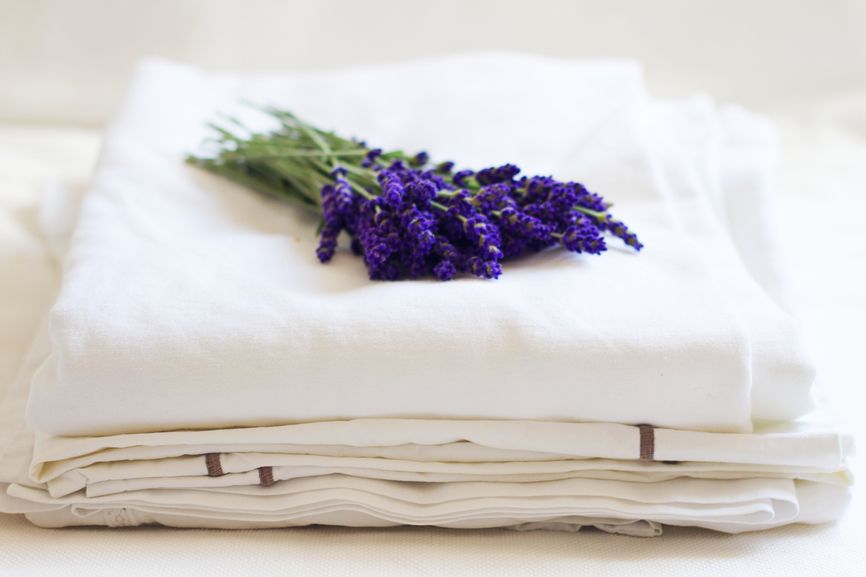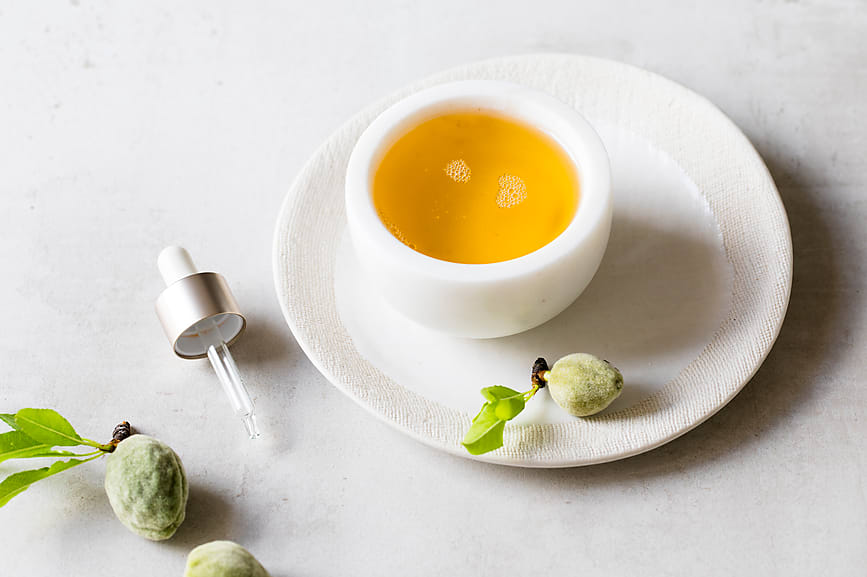Is there anything worse than insomnia? Whether it’s chronic or situational, there’s nothing worse than lying awake all night with your mind racing, wondering if you’ll ever get to sleep as the minutes tick by. What if we told you that you’re just a few drops away from relaxation and a great night’s sleep?
If you’re one of the many who have tried every remedy under the sun to sleep through the night, we’ve got one more option that our team swears by: essential oils. Maybe you’ve seen them on Pinterest or heard a mention from friends, but you’re not sure where to begin.
That’s why we turned to Maryland-based, nontoxic lifestyle expert Nina Lior Klopman to teach us the basics and share her favorite recipes for a good night’s sleep. Nina shared her knowledge, her routine, and her best essential oil recipes with us, and we found it so fascinating, we thought we’d share it with you!
What Are Essential Oils?
Essential oils are simply concentrated compounds extracted from plants—specifically their scent and flavor, or “essence.” They are derived through processes like steam distillation or cold-pressing various parts of the plant (flowers, bark, leaves, or fruit). It can take several pounds of a plant to produce a single bottle of essential oil.
Do Essential Oils Really Work for Sleep?
Essential oils are commonly used for aromatherapy, an ancient, holistic healing treatment that uses natural plant extracts to promote health and well-being.
Through inhaling essential oils, the scent can stimulate areas of your limbic system, which is a part of your brain that plays a role in emotions, behaviors, sense of smell, and long-term memory.
Interestingly, the limbic system is heavily involved in forming memories. This can partly explain why familiar smells can trigger memories or emotions.
Scent memory is such a powerful force. Everyone can think of a smell that, once smelled, instantly transports them to a different time and place.
Therefore, establishing a ritual of using the same essential oils can help create a safe and calm sleeping environment in your bedroom. Anytime you smell that blend, your scent memory is triggered and you’ll float away to that dreamy place!
Finally, the limbic system plays a role in controlling several unconscious physiological functions, such as breathing, heart rate, and blood pressure, which is another reason why essential oils can induce beneficial physical effects such as relaxation and calm.

Want to Create a Sleep Ritual of Your Own?
Here’s what you need to get started:
- Essential oils (see list of oils below)
- An ultrasonic diffuser
- A carrier oil, like jojoba, fractionated coconut, almond, castor, etc.
- 4-ounce glass spray bottles and 10-mL glass roller bottles
Here are a few ideas to incorporate into your nighttime ritual. Try one or try them all! Make sure you pick ones that won’t be difficult for you to turn into a habit, as consistency is crucial for the routine to work.
1. Personal calming scents
Consider making a “perfume” with essential oils that you can roll onto your inner wrists, behind the ears, or on the back of your neck throughout the day when you’re feeling stressed.
The idea is that the more relaxed you are during the day, the better you will sleep at night. In a 10-mL glass roller bottle, combine 10 drops each of your favorite calming scents, and then fill to the top with a carrier oil, such as:
- Petitgrain + Clary Sage
- Cedarwood or Frankincense + Petitgrain (a muskier, masculine option)
- Bergamot + Cedarwood
- Neroli + Vetiver
2. Sleepy-time diffuser blends:
When it’s time to start your nighttime routine, or about an hour before bed, start diffusing a sleep blend in your bedroom to help you make the transition to slumber, such as:
- Lavender + Cedarwood + Bergamot
- Vetiver + Cedarwood + Roman Chamomile
- Neroli + Lavender + Frankincense
It’s good to rotate your blends every few days to avoid desensitization to the oils. And if you don’t have a diffuser, simply make your own room spray by mixing equal parts water and witch hazel (which helps to combine the water and oil) and 25-30 drops of essential oil into a glass spray bottle. Spritz around your room before bed.
3. Relaxing facial massage
This is a great technique from essential oil guru Hope Gillerman. In a 10-mL roller bottle, combine 5 drops each of lavender, frankincense, and cedarwood, and fill with jojoba oil. Shake before use.
Roll a couple of swipes around the edges of your face, and smooth the essential oil from cheekbone to chin with the heel of your hand, moving down, and then forward along the line of your jaw. Massage your temples gently.
4. Tissue Trick
Lie down in bed and put a drop or two of your favorite calming essential oil (cedarwood, neroli, lavender) on a tissue. Gently move the scented tissue from one nostril to the other for 10 breaths. Bonus: Incorporate deep breathing practices, like ujjayi, to take your relaxation to the next level.

Which Essential Oils Help with Sleep?
There are a ton of different essential oils that help for sleep, and since essential oils are based on chemistry, you should experiment to find the oils and blends that work best for you.
Here are some of the top essential oils for sleep and why they may transform your sleep routine:
- Bergamot: A citrus oil (and a key ingredient in Earl Grey tea), bergamot lifts the mood and helps cultivate a worry-free attitude. Use this one when feelings of stress or self-doubt are preventing you from feeling at ease.
- Cedarwood: This oil is very relaxing and helps create a grounded, clear space. It’s also a very useful oil when you need to calm your emotions and blends well with bergamot and vetiver.
- Clary sage: A study of patients undergoing a urodynamic evaluation (methods that estimate bladder and urinary function) showed that clary sage lowered blood pressure levels associated with stress significantly in patients who had smelled clary sage during treatment versus almond oil (the control).
- Frankincense: This oil is biblical and has been used for thousands of years in meditative and ancient therapeutic practices; it’s particularly helpful when preparing your mind to shift into peace and tranquility.
- Lavender: Lavender is the #1 oil for calming yourself and is the most frequently cited oil in research that improves sleep quality and mood.
- Neroli: A wonderful oil for those who experience feelings of anxiousness and have trouble winding down.
- Petitgrain: This is a great alternative for those who don’t like the smell of lavender, as it possesses a similar chemical profile (high in linalool).
- Roman chamomile: Most of us already know about chamomile tea’s benefits for sleepy time! This oil is super floral and gentle and great to use for babies.
- Vetiver: This oil is thicker than molasses and interacts with your limbic system to help release deeply rooted tension and lull you into a state of relaxed sleep.
- Wild orange: Normally an uplifting scent, but when paired with lavender, this combo is especially great at calming and soothing your mood (and is particularly good for babies).
Bonus Oils
- Cypress is a great oil to incorporate into your routine if you deal with any nasal or respiratory difficulties while sleeping.
- Try juniper berry when your kids are dealing with night terrors or other sleep disturbances.
Find Your Essential Oils for Sleep at Jennifer Adams!
Essential oils can be powerful aids in helping you shift gears, wind down from a busy day, and create an ideal sleeping environment. If you’re not sure where to get started, just pick one essential oil for sleep that smells good to you, and make a commitment to incorporate it into your nighttime routine every day. Start today!






